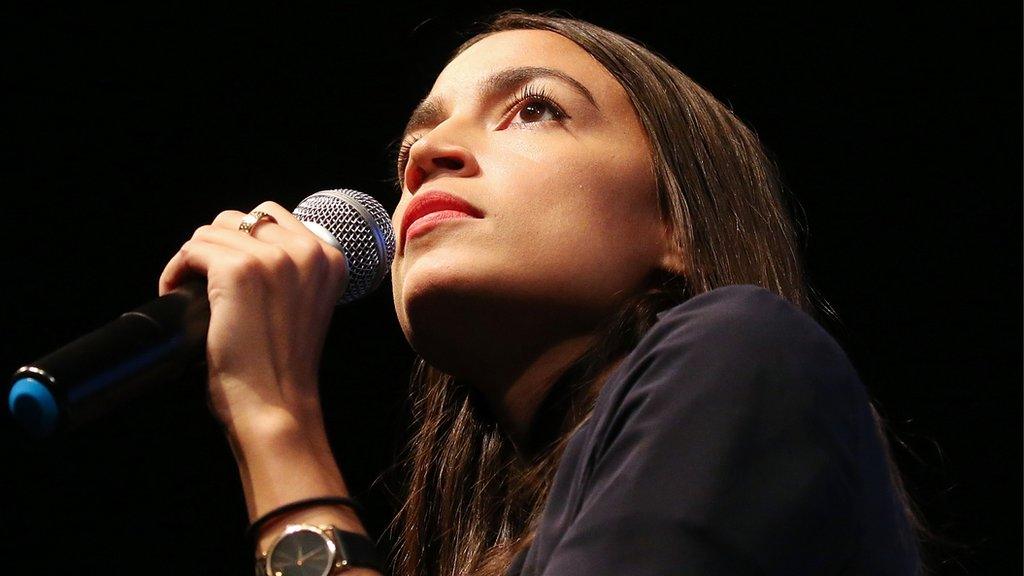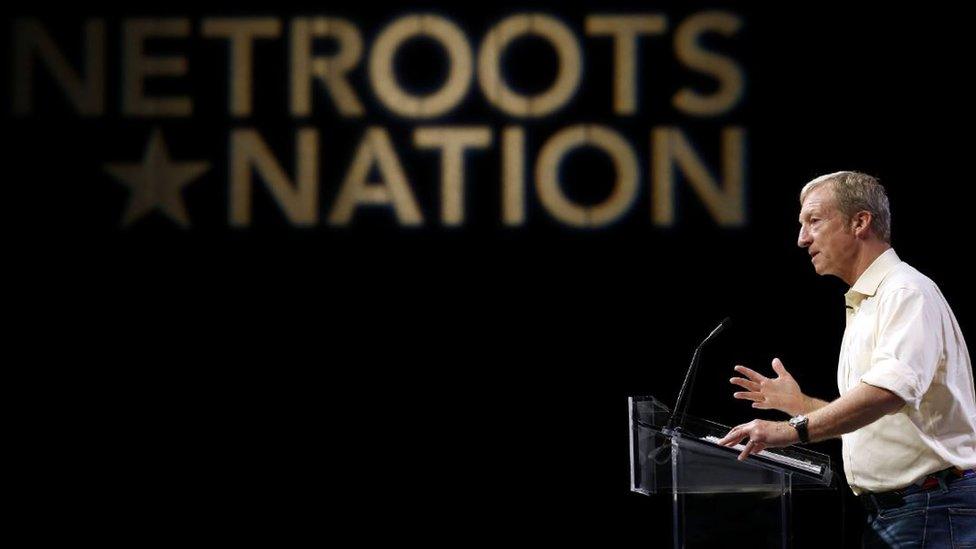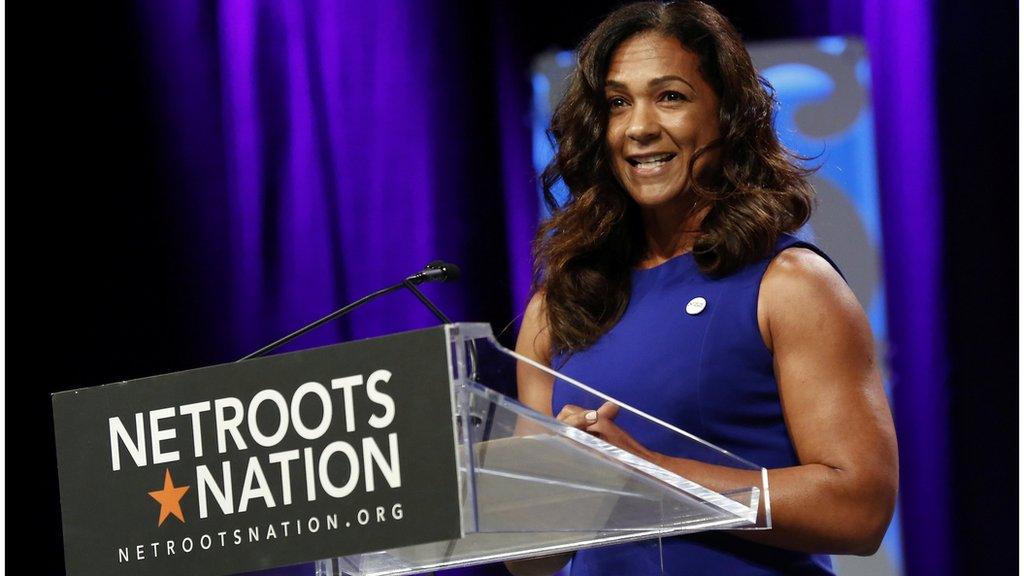Netroots Nation: The battle for the soul of the Democratic Party
- Published

Alexandria Ocasio-Cortez's rise is a symbol of the progressive insurgency in the party
The first year and a half of Donald Trump's presidency has been rough on American progressives. With nationwide mid-terms drawing near, however, they're feeling a flicker of something rarely experienced in the 633 days since election night 2016. Hope.
Tom Steyer, the hedge fund billionaire turned left-wing political activist, posed a question to the crowd at the annual Netroots Nation conference.
"How many people in this room think that the Democratic establishment in Washington is listening to you and doing what you want them to do?"
Among the several thousand grass-roots progressives in the New Orleans audience, just a few hands went up.
"Me neither," Mr Steyer responded. "I don't see a single constructive thing coming out of Washington, DC. Not a thing."
He then launched into a sweeping condemnation of not just Donald Trump, but also Democratic Party politicians - even ones scheduled to speak later at Netroots - who he said were insufficiently willing to support his calls to remove the president from office.

Mr Steyer was throwing red meat to a crowd whose animosity toward Mr Trump was palpable. But a funny thing happened - they didn't seem to want it.
At similar conservative gatherings of right-wing loyalists held as Republicans clawed their way back to power over the course of the Obama presidency, attacks on their party's "establishment" drew shouts of approval. Texas Senator Ted Cruz, in his 2016 presidential campaign, elicited some of his biggest applause when he went after Republican congressional leaders. Mr Trump's rise can be directly attributed to this anti-establishment fervour.
At Netroots on Thursday night, however, the left-wing audience had no such interest in eating their own. With the Democratic Party at its lowest ebb of power in a generation, their more immediate focus was made apparent when Mr Steyer asked - rhetorically - what the Democratic Party's "real plan" was.
"Take back the House!" someone in the back of the hall shouted.
If the tepid response to Mr Steyer at Netroots Nation is any indication, the Democrats' progressive wing isn't interested in an intra-party civil war at the moment. They just want a foothold back in power - an opportunity the mid-term congressional elections in November could provide them.
"People are excited; people are enraged," says Atima Omara, a progressive political strategist who moderated a Netroots panel on Thursday morning. "People still cling onto the fact that we have a democracy. Sometimes it doesn't always work as well as we would like it to, but we have to stay active, and that's the most important thing."
In three months, the gears of that democracy will grind into action, as voters across the country decide the composition of the entire US House of Representatives, more than a third of the US Senate, 36 governorships and nearly every state legislature.

Aimee Allison, president of Democracy in Color, wants more diverse candidates
Those elections, for now, are the source of hopes on the left and the glue holding the Democratic Party's various factions together.
"I feel like progressives here are by and large on the same page," says Mary Rickles Conley, political and communications director of Netroots Nation. "I think people are fired up, and they're mad because they're not happy with the current state of where things are right now. But I certainly think that people are very excited about the crop of candidates that are running."
Conley says she knows that even with the sense of common cause - and optimism that electoral success may be just a few months away - there's an ongoing and active debate over the direction of the Democratic Party.
Should it move to the centre, in an attempt to reach across the aisle to disaffected Republicans and bring home blue-collar voters who flipped from Barack Obama in 2012 to Mr Trump in 2016?
Or should the party push left, engaging new voters by backing progressive priorities like a higher minimum wage, universal healthcare, social and economic justice and tuition-free college education?
The "Pink Wave": How women are shaping the 2018 US elections
"Our swing voters are not from [Republican] red to [Democratic] blue, but from non-voter to voter" Aimee Allison, president of Democracy in Color, told the Netroots audience on Thursday night. She concluded by calling for Democrats to "get in formation" behind minority female candidates who can turn out those previously overlooked voters.
It's been a recurring theme at the Netroots conference this year, that the Democratic Party should better reflect the cultural diversity of its base. In the past, such debates at Netroots have led to disruption. In 2015, Democratic presidential hopeful Martin O'Malley was shouted down by Black Lives Matters activists in one of the earliest signs of the movement's growing power within progressive ranks.
This year seems different - perhaps because the multicultural progressive activists feel like they're winning the debate over the future of the party.
They point to successful Democratic nominees like Stacey Abrams of Georgia, who defeated a party-backed candidate in the Democratic primary and would become the first black woman governor if she wins the general election in November. And Alexandria Ocasio-Cortez, the 28-year-old Latina community organiser who beat a top Democratic member of Congress in her primary and has become a rising star on the progressive left.
Alexandria Ocasio-Cortez celebrates her win with supporters
Ms Ocasio-Cortez has appeared at Netroots Nation before, but this year she's one of the keynote speakers on the final night of the conference - given equal footing to sitting US senators and Democratic presidential hopefuls.
"It's a sign that people respond to bold visionary politics," Conley says of Ms Ocasio-Cortezs's rise. "If you look at the candidates who are really gaining the most excitement right now, it's people who are really speaking to that diverse majority of people."
Of course the fractures within the Democratic Party - which grew to debilitating rifts during the 2016 presidential primary campaign between Hillary Clinton and Democratic Socialist Bernie Sanders - are still there, buried somewhere beneath the surface.
The liberating thing about being totally out of power is you don't have to spend too much time debating what you're going to do with that power - just how to get power back. Stopping Mr Trump - not through Mr Steyer's impeachment drive, but through voting Republicans out of office - is the overarching goal for now.
It probably won't take long for the simmering conflicts to bubble over again if liberals find success in November - or for the long knives to come out for party leaders if Democrats falls flat.
Why are US election campaigns never-ending? Ask America has the answer
In California, where the electoral system is set up to allow two Democrats to face off against each other on the November general election ballot, those divisions are already readily apparent.
"Many working families want leadership that's on the front lines, not the sidelines," says Kevin de León, the California legislator who is running against a fellow Democrat, long-time US Senator Dianne Feinstein. "They don't want leadership that speaks to complacency, conciliation and passivity. They want a bold agenda."
Mr de León, who sounds a bit more like fellow Californian Steyer in his condemnation of national politics, was a Saturday evening keynote speaker at Netroots. He says he doesn't want to play up the divide within the Democratic Party, but the system in Washington isn't working - and the choice is either to allow it to stay in place or disrupt it.
For most at Netroots, that's a conversation for another day. Three months before the mid-terms, the future - for the first time since Mr Trump's shocking presidential victory - could be looking brighter.
"We've got to do this together," Colette Pichon Battle, a Louisiana environmental and social justice activist told the progressive gathering on Thursday. "The time is now. It's time to go."
